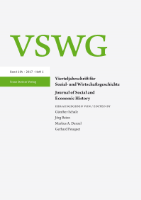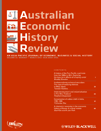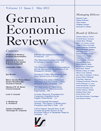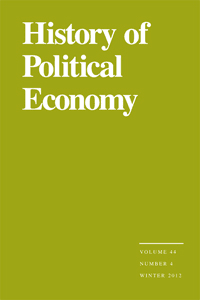
History of Economics Review
Scope & Guideline
Advancing Understanding through Historical Perspectives
Introduction
Aims and Scopes
- Historical Analysis of Economic Thought:
The journal provides in-depth explorations of key figures and movements in economic thought, examining their contributions and the historical contexts that shaped them. - Interdisciplinary Approaches:
It employs various methodologies, including historical, philosophical, and sociological perspectives, to analyze economic theories and their implications. - Focus on Marginalized Voices:
The journal emphasizes the contributions of underrepresented groups in economics, such as women and non-Western thinkers, thereby broadening the scope of traditional economic history. - Critical Examination of Economic Policies:
It analyzes historical economic policies and their impacts, helping to understand the evolution of economic governance and its consequences. - Engagement with Contemporary Issues:
The journal connects historical economic thought with current economic debates, demonstrating the relevance of past ideas to modern challenges.
Trending and Emerging
- Reception History of Economic Ideas:
There is a growing interest in how economic ideas have been received and interpreted over time, reflecting a shift towards understanding the impact of economic thought beyond its original context. - Interconnections Between Different Economic Traditions:
Recent works highlight the mutual influences between Russian and Western economic thought, suggesting a trend towards comparative studies that examine cross-cultural exchanges in economic ideas. - Women in Economics:
There is an increasing focus on the contributions of women to economic thought, as evidenced by papers dedicated to recognizing the historical roles of female economists, which aims to diversify the narrative of economic history. - Economic Governance and Global Issues:
Emerging themes related to global economic governance reflect an interest in understanding the historical roots of contemporary economic challenges, such as international trade and economic policy. - Biographical Studies of Economists:
The journal is seeing a rise in biographical studies that provide insights into the lives and contributions of influential economists, thereby personalizing the narrative of economic history.
Declining or Waning
- Classical Economic Theory:
There has been a noticeable decrease in the publication of papers directly focusing on classical economic theories, suggesting a shift towards more contemporary and applied economic discussions. - Technical Economic Models:
The focus on technical and mathematical modeling in economic history seems to be diminishing, as the journal leans more towards qualitative analysis and narrative-driven research. - Narrow National Histories:
Research centered around the economic history of specific nations, particularly those with limited global influence, is becoming less prevalent, indicating a broader interest in transnational and comparative studies. - Controversial Economic Debates:
Discussions surrounding highly contentious economic debates from earlier periods, such as those stemming from the Cold War, are less frequently addressed, reflecting a possible shift towards more reconciliatory or consensus-driven narratives.
Similar Journals

VSWG-Vierteljahrschrift fur Sozial-und Wirtschaftsgeschichte
Fostering Critical Discourse in Cultural and Economic StudiesVSWG - Vierteljahrschrift für Sozial- und Wirtschaftsgeschichte is a distinguished academic journal published by Franz Steiner Verlag GmbH in Germany, focusing on the interdisciplinary fields of social and economic history. With an ISSN and E-ISSN of 0340-8728, this journal serves as a vital resource for scholars, researchers, and students interested in the complexities of socio-economic transformations across historical contexts. While it currently does not offer open access, its contributions are significant in raising critical discussions within cultural studies and economic history, as evidenced by its Q3 and Q4 rankings in various categories, including Cultural Studies and Sociology. Although the Scopus rankings reflect competitive standings, the journal continues to provide meaningful discourse and insights, supporting academic endeavors in an increasingly interconnected world.

Oeconomia-History Methodology Philosophy
Exploring the Intersections of Economics, History, and PhilosophyOeconomia-History Methodology Philosophy, published by ASSOC OECONOMIA, is a distinguished academic journal focused on the interdisciplinary study of economics, history, methodology, and philosophy. With its ISSN 2113-5207 and E-ISSN 2269-8450, this Open Access journal has been committed to disseminating high-quality research since 2011, enabling widespread accessibility to its content. Based in Paris, France, the journal holds impressive rankings, including a Q1 quartile in History and a Q3 quartile in both Economics, Econometrics and Finance, as well as Sociology and Political Science for 2023. This diversity highlights its multifaceted approach to understanding complex societal issues. With significant visibility in leading databases, including Scopus, it appeals to researchers, professionals, and students alike, fostering robust discussions and innovative insights in their respective fields. The journal currently spans from 2018 to 2024, offering a platform for critical analyses and theoretical advancements that challenge established norms and encourage new perspectives.

AUSTRALIAN ECONOMIC HISTORY REVIEW
Bridging History and Economics for Informed Analysis.The Australian Economic History Review, published by Wiley, is a premier journal dedicated to advancing the field of economic history through rigorous research and insightful analyses. With an ISSN of 0004-8992 and an E-ISSN of 1467-8446, this journal has established itself as a critical resource for scholars and practitioners alike, with a notable Scopus ranking that places it in the 85th percentile among History journals and provides a complementary perspective in Economics and Econometrics fields. Since its inception in 1974, it has provided a platform for innovative research, fostering discussions that span Australian economic developments and their global contexts. Although it offers limited Open Access options, the journal remains a vital source of information for those seeking to understand the intricate dynamics of economic processes through historical lenses. Researchers, professionals, and students are encouraged to engage with the rich content that contributes significantly to both academic scholarship and practical implications in economic historiography.

Global Intellectual History
Advancing Perspectives on Global NarrativesGlobal Intellectual History is an esteemed journal published by Taylor & Francis Ltd, dedicated to exploring the intricate interconnections between global cultures, historical narratives, and intellectual thought from 2016 to 2024. With an ISSN of 2380-1883 and an E-ISSN of 2380-1891, this journal holds a Q2 category ranking in multiple fields, including Arts and Humanities, Cultural Studies, and History, indicating its reputable standing within the academic community. Although not openly accessible, it caters significantly to scholars and students interested in the multifaceted dimensions of intellectual history, offering critical insights and fresh perspectives that enhance our understanding of global narratives. With a Scopus ranking placing it in the upper percentiles across various categories, Global Intellectual History serves as an essential resource for advancing research and scholarly discourse in its field.

Journal of Private Enterprise
Exploring the Dynamics of Private Enterprise and Economic GrowthJournal of Private Enterprise, ISSN 0890-913X, is a prestigious publication under the auspices of the Association for Private Enterprise Education, based in the United States. Established in 2008, this journal serves as a vital platform for scholarly exploration and discourse in the realms of business, management, and economics, emphasizing the significance of private enterprise in fostering economic development and innovation. With its commitment to rigorous peer-reviewed research, the journal enriches the academic community, even as it currently holds a Q4 ranking in the categories of Business, Management and Accounting, and Economics, Econometrics and Finance, according to the 2023 metrics. While it does not offer open access, the journal's content is crucial for researchers, professionals, and students interested in understanding the dynamics of private enterprise and its impact on global economic landscapes. Scholars will find valuable insights into the challenges and opportunities facing private enterprises in today's complex environment, making this journal an essential resource for anyone invested in the future of economics and private enterprise.

PSL Quarterly Review
Exploring the Frontiers of Economic and Legal StudiesPSL Quarterly Review, published by ASSOC PAOLO SYLOS LABINI, is a distinguished open-access journal based in Italy, dedicated to fostering discourse in multifaceted fields such as Business, Management, and Accounting, as well as Economics and Law. Since its inception in 2009, the journal has carved a niche in academia, providing a platform for innovative research and critical thought. With an impactful presence reflected in its 2023 Scopus ranks, including Q3 classifications in Business, Management, Accounting, and Economics, alongside a Q2 classification in Law, the PSL Quarterly Review serves as a vital resource for scholars and practitioners alike. The journal aims to bridge the gap between theoretical frameworks and practical applications, thus enriching the repertoire of contemporary economic and legal studies. Its broad accessibility and commitment to quality scholarship ensure that it remains a pivotal publication for those engaged in advancing knowledge across relevant disciplines.

BUSINESS HISTORY REVIEW
Charting the Evolution of Business Through Time.Business History Review is a prestigious academic journal published by Cambridge University Press that has been at the forefront of historical scholarship in business since its inception in 1926. With a strong emphasis on interdisciplinary research, it covers a wide range of topics within the field of business history, making it an essential resource for researchers, professionals, and students interested in understanding the historical contexts that shape contemporary business practices. The journal is recognized for its high scholarly impact, featuring a Q1 ranking in History and Q2 rankings in both Business and International Management and Business, Management and Accounting (miscellaneous) categories. Although not an open-access publication, it offers significant insights and groundbreaking research for its audience. With a commitment to promoting a deeper understanding of business's past, Business History Review remains a vital publication for those seeking to connect historical analysis with modern business challenges.

German Economic Review
Fostering Scholarly Excellence in German EconomicsGerman Economic Review is a distinguished academic journal published by WALTER DE GRUYTER GMBH, focusing on diverse aspects of economics and econometrics. With its ISSN 1465-6485 and E-ISSN 1468-0475, the journal serves as a vital platform for disseminating high-quality research from both established scholars and emerging voices in the economic field. Housed in the UK, the journal contributes significantly to the academic community, evidenced by its placement in the Q3 category for Economics and Econometrics in 2023 and its Scopus ranking of #381 out of 716, reflecting its impactful presence in the discipline. German Economic Review does not offer open access options; however, its convergence from 2001 to 2024 indicates a long-standing commitment to advancing economic discourse. This journal is ideal for researchers, professionals, and students eager to engage with contemporary economic theories and applications.

CAMBRIDGE JOURNAL OF ECONOMICS
Transforming Research into Economic ApplicationsCambridge Journal of Economics, published by Oxford University Press, is a premier academic journal in the field of economic theory, policy, and applications, catering to researchers, professionals, and students alike. With a rich history dating back to 1977, this journal has established itself as a notable contributor to critical discourse in the arena of Economics and Econometrics. With an impressive Scopus ranking of #210 out of 716 in its category, placing it in the 70th percentile, the journal maintains a solid Q2 classification, reflecting its significant impact and contribution to the field. Although it operates on a subscription basis, the Cambridge Journal of Economics is accessible through a range of academic databases and libraries, ensuring that its high-quality research reaches a wide audience. The journal aims to advance the understanding and application of economic principles, making it an essential resource for anyone looking to deepen their knowledge or stay updated with the latest research trends in economics.

HISTORY OF POLITICAL ECONOMY
Illuminating the Past to Understand Economic FuturesHISTORY OF POLITICAL ECONOMY, published by DUKE UNIVERSITY PRESS, stands as a premier journal in the interdisciplinary fields of political economy and history. With an ISSN of 0018-2702 and an E-ISSN of 1527-1919, the journal provides a platform for rigorous scholarship that spans from its converged years beginning in 1986 to the present, aiming to elucidate the complex interplay between economic policies and historical contexts. It holds impressive rankings, peaking in the Q1 category for History and Q2 in Economics and Econometrics as of 2023, showcasing its impact and prestige in the scholarly community. Notably, it is ranked within the 88th percentile in Arts and Humanities History and maintains a significant presence in the 24th percentile for Economics and Econometrics. Although it does not currently offer open access, the journal remains committed to advancing knowledge and fostering thoughtful discourse among researchers, professionals, and students alike. Located in Durham, NC, the journal is dedicated to exploring the rich historical narratives that have shaped economic thought and policy, making it an essential read for those seeking to navigate the intricate landscape of political economy.